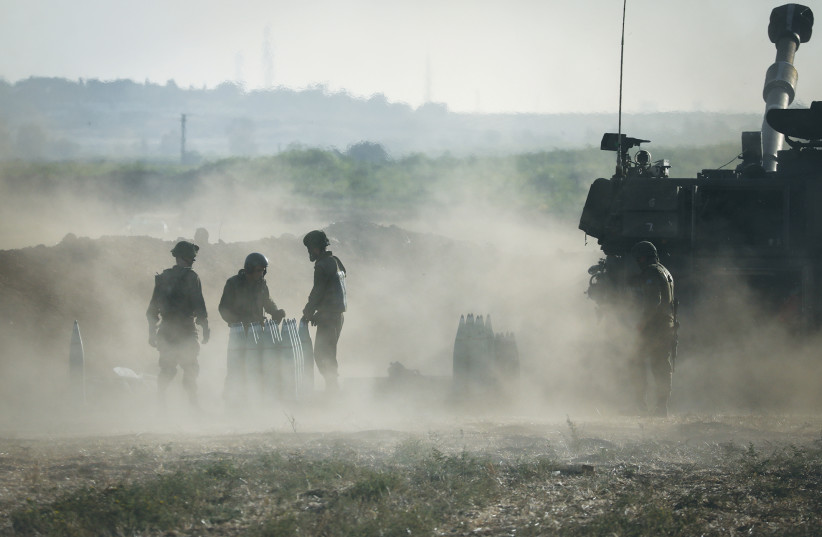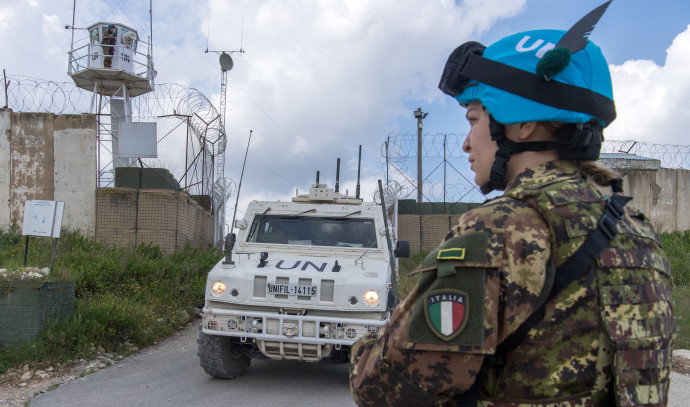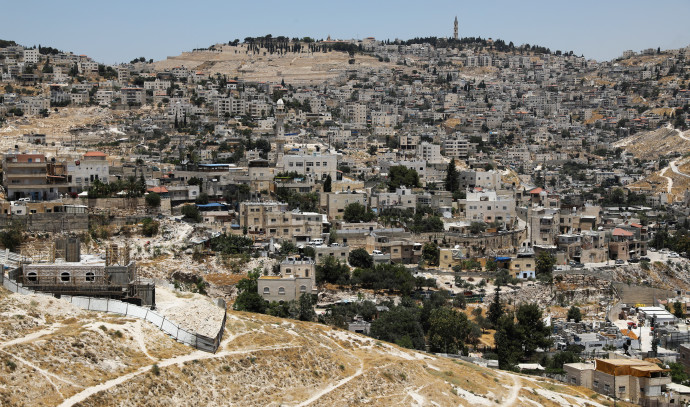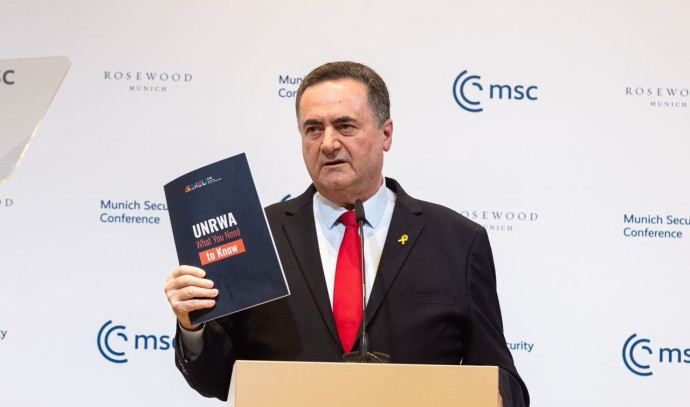world news
Israel complied with int’l law in Gaza war against Hamas – JINSA

In addition, the report found that despite accusations from human rights groups that Israel violated international law, some Israeli precautions actually exceeded “those implemented in recent US combat operations that we participated in, despite confronting an adversary that often sought to exacerbate that risk deliberately,” the report said.
The authors included about a dozen senior and retired US military officers who traveled to Israel to examine the actions of both sides, and included: Lt.-Gen. Robert Ashley, former director of the Defense Intelligence Agency, Lt.-Gen. John M. Bednarek, former senior defense official in Iraq, Lt.-Col. Geoffrey S. Corn, the former chief international lawyer for US Army Europe and others.
If the IDF was mostly focused on degrading Hamas’s attack capabilities, the Gazan terror group was equally investing resources in a massive disinformation campaign to delegitimize Israel alongside its firing of rockets at Israeli civilians.
IRON DOME interceptors destroy rockets launched from the Gaza Strip toward Israel in the skies over Ashkelon in May. (credit: AMIR COHEN/REUTERS)
Comparing the Israeli experience to potential future challenges which the US may face, the report said: “The ability of an unscrupulous adversary to constrain military operations or even achieve strategic advantage against a much more capable opponent through the use of human shields and disinformation about both facts and law is a particularly concerning harbinger of what the United States might soon face.”
JINSA said that the US “will have to contest such conflicts emphatically, and preemptively, in the information domain as much as in the physical. The US military should train to operate in environments significantly more complex than Gaza – just as densely populated by civilians, but farther afield, with more limited intelligence, no air dominance, and a contested electromagnetic spectrum – while remaining committed to LOAC compliance.”
At the same time, the report said, “the US military must also be clear-eyed about setting realistic expectations for what that compliance will look like in such operations – it might not be feasible to take the same extraordinary but costly precautions Israel employed in Gaza.”
“Investments, together with partners like Israel, in new technologies to counter enemies’ advancing capabilities and enable mitigating risk to civilians will be critical,” it continued.
Getting more specific, the report said that, “the IDF has robust processes in place to ensure legal vetting of proposed targets, specific method of attack, and potential incidental injury and collateral damage. Its operations adhered to LOAC’s mandate to implement all feasible precautionary measures to mitigate risk to the Gazan civilian population.”
“Numerous leaflets were dropped, telephone calls were placed to residents, and text messages were sent to warn Gazan civilians to leave a defined area of operations in advance of airstrikes,” said the report.
JINSA stated that, “minutes preceding the actual attack, small munitions delivered a ‘knock on the roof’ to provide further warning of the impending attack – a tactic first used in 2014 and therefore familiar to the civilian population.”
In addition, “multiple surveillance platforms were dedicated to each target, often for hours, to ensure that civilians evacuated areas of attack. These impressive precautions often came at an operational and tactical cost to the IDF, allowing belligerents to escape, diminishing the tactical advantage of surprise, and reducing the number of other targets that could be monitored or struck,” it said.
Next, the report noted the May war was the “first artificial intelligence (AI) war” in which the IDF employed “AI algorithms and machine learning, paired with intelligence analysts in ‘man-machine teams’ to flag and review potential targets… that were significantly more detailed, accurate, and timely than in 2014.”
The report accepted Israeli estimates that out of 264 Palestinians killed, 37% were combatants and another 15% were believed to be combatants, and noted that no civilians were killed in precision attacks on 20 high rise towers.
Also, the report said that “the IDF utilized thousands of Israeli and US produced PGMs (Precision Guided Missiles), including small laser-guided bombs (SLGB), GBU-39/B small diameter bombs (SDB) and Joint Direct Attack Munition (JDAM) tail kits that convert unguided air-to-ground munitions to PGMs. With these weapons, the IDF could apply its precise and timely intelligence regarding target locations,” to limit civilian casualties.
Tracking the disinformation campaign against the IDF, the report said that the problem started with, “The media and public’s misunderstanding of how LOAC applies to military operations – especially the false assumption that the effect of an attack, and especially the presence of civilian casualties, determine its legality.”
“Coupled with social media’s ability to transmit graphic images rapidly and globally without explanatory context,” the report said Hamas succeeded at making “audiences more receptive to Hamas’s disinformation that Gazan suffering was evidence of Israeli LOAC violations.”
Numerous organizations, including the United Nations, Amnesty International and Human Rights Watch – organizations claiming to be experts in the relationship between law and military operations – quickly seemed to accept Hamas’s assertions of unlawful IDF operations.
JINSA accused these groups of misunderstanding or mischaracterizing the principle of distinction “to mean that military objectives cannot be lawful targets whenever they are placed in civilian areas. Meanwhile, the principle of proportionality seems to be interpreted as presenting some quantitative (but unspecified) threshold of civilian casualties or destruction of civilian property above which an attack violates LOAC. Neither of these interpretations is correct.”
Also, the report blamed Israel for only using the IDF spokesperson giving narrow details about specific operations and as its main microphone to the world as opposed to using the Foreign Ministry to educate the world about the larger context.
“On their own, without context and explanation, these facts proved insufficient to align the public perception of the legitimacy of IDF operations with the reality of their LOAC compliance,” said JINSA.
Moreover, the report flagged that Israel’s effectiveness in explaining its narrative was “further decreased by delays and several major missteps, including delayed justification for the IDF’s strike on the al-Jalaa building housing international media in Gaza as well as the perception that the IDF intentionally lied to the media about launching ground operations in Gaza.”
Further, the report stated, “we encountered a lingering resignation among military and civilian leaders in Israel that no improvement in their messaging can overcome the rush to condemnation that appears reserved for Israel alone among all nations… But our review also indicates that even if messaging efforts have marginal impact, ceding the information domain to the enemy is an unacceptable response.”
“To improve communications with international media, organizations and publics, militaries should seek more effective ways to rapidly provide more detailed information to the public,” said the report.
world news
International Peacekeepers Day: UNIFIL’s role questioned amid Israel-Hezbollah conflict

As international actors debate the legitimacy of Israel’s operation in Gaza, the war on Israel’s northern front rages on. Deaths from the Israel-Hezbollah conflict are continuing to rise, and over 100,000 Israelis are still evacuated from their homes in northern Israel, leading some to question the efficacy of the UN peacekeeper force meant to maintain security in southern Lebanon.
Israel’s 1978 invasion pushed the PLO north of the Litani River, about 18 miles from the border, in order to limit attacks against Israel. Despite the establishment of UNIFIL as a peacekeeper force, Israel returned to Lebanon in 1982. In 2006, another conflict broke out between Israel and Hezbollah, a Lebanese Shiite group with ties to Iran.
After 34 days of fighting between Hezbollah and Israel in 2006, the UN brokered a cease-fire. Under the agreement, UN Security Council Resolution 1701, Israel and Hezbollah agreed to cease hostilities, and UNIFIL was tasked with ensuring that no armed groups other than itself and the Lebanese army operated south of the Litani River.
Today, UNIFIL comprises more than 10,000 soldiers from 49 nations. In addition to monitoring the border, the organization also provides humanitarian assistance to civilians affected by the exchange of fire in southern Lebanon.
UNIFIL’s role pre-October 7
“Before Oct. 7, we were able to guarantee the overall stability of the southern border for years, and this was clearly a success,” Andrea Tenenti, spokesperson for the UNIFIL mission, told The Media Line. “We played an active role. In fact, we have helped the Lebanese army, starting from 2008, to regain control of the southern part of the country.”
Despite UNIFIL’s successes, Hezbollah has grown stronger in southern Lebanon since 2006, especially in the towns and villages along the 75-mile-long demarcation line, leading some to criticize UNIFIL as ineffective. Since Oct. 7, as constant clashes between Hezbollah and Israel have plagued southern Lebanon and northern Israel, those criticisms have grown louder.
“The UNIFIL mission started with very weak points and ended up being more a cease-fire resolution than a peacekeeping one,” Hanin Ghaddar, a senior fellow at the Washington Institute, told The Media Line. She noted that the forces mostly report violations.
“They do not possess the tools and permission from the UN to confiscate weapons or even arrest those affiliated with” Hezbollah, she said.
Tenenti characterized UNIFIL as “the only ones who can mediate properly” amid the rising tensions, noting that the group had arranged meetings between the Israeli and Lebanese armies.
UNIFIL does not only monitor the conflict between Hezbollah and Israel—at times, it finds itself caught up in that contact. Among other incidents, a car bomb killed six UNIFIL personnel in 2007, and in October, two mortar shells of undetermined origin hit a UNIFIL base, injuring one peacekeeper.
“Hezbollah targets UNIFIL because they do not want another actor in the south,” Ghaddar explained. “It is never an accident when UNIFIL personnel is targeted because the militant group aims to send a message both to the countries that serve in these forces and to the UN: do not interfere with our activities in the southern part of the country.”
Avraham Levine, a speaker at the northern Israel-based Alma Research and Education Center, told The Media Line that Hezbollah has more control over UNIFIL than UNIFIL does over Hezbollah.
“There are areas where UNIFIL personnel cannot go to, and if they end up by mistake in Hezbollah’s territory, they are attacked on the spot, their vehicles are burnt, and sometimes they are even shot down,” he said.
Levine also said that Hezbollah uses UNIFIL bases for its military purposes.
“Both in 2006 and in further operations that Israel carried against Hezbollah, the militants used UNIFIL compounds as shields for their operations in order to stop Israel’s counterattacks against a UN base,” he said.
One of the rockets launched at Israel by Hezbollah in December originated just 20 yards from a UNIFIL compound.
Levine said that the Lebanese army’s lack of action to rein in Hezbollah relates to the Shia sympathies of many of the soldiers as well as the interest in avoiding another Lebanese civil war.
Describing both UNIFIL and the Lebanese army as ineffective deterrents to Hezbollah, he said that Israel may have to invade Lebanon once again.
“We cannot risk another Oct. 7 in the northern part of Israel since [Hezbollah Secretary-General Hassan] Nasrallah publicly claimed his goal to invade the Galilee. Even if this scenario is not pleasant for both sides, we may need to stop Hezbollah by entering Lebanon as we did in the past,” he said.
In the event that a full-scale war between Israel and Hezbollah does break out, UNIFIL may be a target, Levine said. “Maybe this may push to reconsider its mission in the first place,” he speculated.
world news
Israel’s High Court rejects petition of east Jerusalem family facing eviction

Israel’s High Court of Justice rejected on Sunday a petition by an east Jerusalem family seeking to challenge a previous court decision – which ruled that the family must vacate their home in Silwan in favor of Jewish residents, the Israeli NGO Peace Now reported.
The Shhadeh family, from Batan al-Hawa in Silwan, challenged Judge Noam Solberg’s ruling, which rejected their appeal request. However, the Shhadeh family claimed that the court did not seek their response to the Jewish buyers’ applications in the case, leading to a flaw in the court’s decision-making process. Their voices were not heard before the decision – contrary to procedural rules.
However, on Sunday, the High Court rejected the petition.
Peace Now, an Israeli NGO working to promote a two-state solution, made a statement on the ruling, saying, “This is a political move, under the guise of legal proceedings, for the forcible displacement of a Palestinian community and its replacement by settlers in the heart of a Palestinian neighborhood in east Jerusalem.”“The responsibility to prevent the injustice lies with the government,” Peace Now added. “It must determine that if settlers have rights to properties from before 1948, they should be compensated for them, not to have the right to evict families who lawfully purchased the property and lived there for decades.”
Currently, all legal paths have reportedly been exhausted, and the family will need to evict its four-floor home by June 1. If they do not leave willingly, the Jewish buyers can file a procedure that would see police forcefully evict residents.
Background on the case
In November 2022, the District Court rejected the Shhadeh family’s appeal and ruled that they must vacate their home. The family then filed a request to appeal to Israel’s High Court. Solberg, the judge who received the case, decided in 2023 to wait for the position of the Attorney General in a similar eviction case.
In the months that passed, while waiting for the Attorney General’s decision, the Jewish buyers’ lawyer submitted six requests to the court to expedite the decision and rule on the case.
Following their sixth request in April 2024, Judge Solberg decided not to wait for the Attorney General’s decision and determined that the family must vacate their home. The family submitted a motion for reconsideration, which was also rejected by the judge. Last week, the family filed a petition to the High Court against the decision, which was rejected on Sunday.
Ateret Cohanim, a right-wing group, was involved in the case and has filed numerous eviction lawsuits against some 84 Palestinian families in Silwan, Peace Now stated. Since 2015, 14 families have been evicted from Batan al-Hawa.
world news
FM Katz severs connection between Spain’s representation in Israel and Palestinians

Israel will bar the Spanish Consulate in Jerusalem from servicing West Bank Palestinians to protest Madrid’s decision this week to unilaterally recognize Palestinian statehood.
“I have decided to sever the connection between Spain’s representation in Israel and the Palestinians,” FM Israel Katz wrote in a post on X on Friday.
Spain has an embassy in Tel Aviv that services Israelis and a consulate located in east Jerusalem that acts as a de facto embassy to the Palestinian Authority.
Most countries similarly split their missions, with an embassy in the Tel Aviv area that services sovereign Israel and a second mission located either in east Jerusalem or Ramallah for West Bank Palestinians.Decision came after recognition of Palestinian statehood
Katz wrote Friday that he would “prohibit the Spanish consulate in Jerusalem from providing services to Palestinians from the West Bank.”
He ordered the measure two days after Spain, Ireland and Norway announced they would unilaterally recognize Palestine as a state, a measure that officially goes into effect on May 28.
The Israeli Foreign Ministry immediately recalled its envoys from those three countries and severely reprimanded the ambassadors of those three countries at a meeting in Jerusalem.
Israel also plans to take additional measures against those three countries. Katz focused in particular on Spain because the country’s Deputy Prime Minister Yolanda Diaz used the phrase “from the River to the Sea Palestine will be free” in a video message this week.
The slogan which calls for the borders of a Palestinian state to stretch from the Jordan River to the Mediterranean Sea, is seen as a call for the elimination of the state of Israel, which is located din that territory.
Katz wrote, “If this ignorant, hate-filled individual wants to understand what radical Islam truly seeks, she should study the 700 years of Islamic rule in Al-Andalus—today’s Spain.”
-

 Solar Energy3 years ago
Solar Energy3 years agoDLR testing the use of molten salt in a solar power plant in Portugal
-

 Camera3 years ago
Camera3 years agoCharles ‘Chuck’ Geschke, co-founder of Adobe and inventor of the PDF, dies at 81
-

 TOP SCEINCE2 months ago
TOP SCEINCE2 months agoStellar winds of three sun-like stars detected for the first time
-

 Solar Energy6 months ago
Solar Energy6 months agoGlencore eyes options on battery recycling project
-
world news6 months ago
Gulf, France aid Gaza, Russia evacuates citizens
-
world news2 months ago
Jewish diaspora expresses concern as Iranian drones launch toward Israel
-

 TOP SCEINCE2 months ago
TOP SCEINCE2 months agoBrightest gamma-ray burst of all time came from the collapse of a massive star
-

 Camera7 months ago
Camera7 months agoSony a9 III: what you need to know

